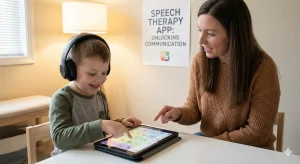Overcoming Auditory Processing Disorder: Effective Strategies
By Wellness Hub
Last Updated: September 3, 2024
Auditory Processing Disorder (APD) isn’t just about hearing loss; it’s about how your brain makes sense of sounds. Imagine being in a room full of conversations, and while most people can tune into the person they’re talking to, someone with APD might struggle to filter out the background noise. It’s not that they can’t hear—it’s that their brain processes the sounds differently. This can make everyday activities, like following conversations or understanding instructions, feel overwhelming.
Understanding APD is crucial, especially for parents, educators, and anyone who might be experiencing these symptoms. For children, it can affect learning, social interactions, and even self-esteem. Adults with APD might find it challenging in work settings or social situations, often feeling frustrated by simple tasks like following a group discussion or picking up on subtle changes in tone or sarcasm.
What is Auditory Processing Disorder?
Auditory Processing Disorder (APD) is more than just a hearing issue—it’s a condition that affects how the brain interprets sounds. Unlike typical hearing loss, where the ears might struggle to pick up sounds, APD involves a disconnect between the ears and the brain’s ability to process what’s heard. Imagine listening to a conversation in a noisy room; while others might find it easy to focus on a single voice, someone with APD could find all the sounds jumbled together, making it hard to understand the words clearly.
APD can be confused with other learning disorders or behavioral conditions, such as ADHD or dyslexia, because it can impact a person’s ability to follow directions, read, or even engage in conversations. However, APD is distinct in that it specifically relates to difficulties in processing auditory information, not visual or overall cognitive issues.
The disorder can affect individuals of all ages, but it’s most commonly identified in children. Kids with APD might struggle in school environments, where listening is a big part of learning. They might appear to be not paying attention, when in fact, they are just having trouble processing what they hear. Early identification and support can make a significant difference in managing APD effectively.
You might also come across the term Central Auditory Processing Disorder (CAPD), which is often used interchangeably with APD. Both terms refer to the same condition, highlighting the central (brain) aspect of the processing challenges rather than the peripheral (ear) aspect of hearing.
Also read: Exploring the Impact of Dyslexia on Speech and Communication
Symptoms of Auditory Processing Disorder
Auditory Processing Disorder (APD) can present with a variety of symptoms, making it tricky to identify at first glance. Common signs include difficulty distinguishing similar sounds, trouble following conversations—especially in noisy environments—and challenges with remembering spoken instructions. If you or someone you know frequently asks for things to be repeated or seems overwhelmed in busy, loud places, these could be indicators of APD.
For children, these symptoms can directly impact school performance. Imagine trying to learn when you can’t clearly hear your teacher’s instructions or when every classroom noise feels equally loud and distracting. This can lead to frustration, reduced confidence, and even avoidance of activities that involve listening, like group work or discussions.
Social interactions can also become challenging. Understanding jokes, sarcasm, or even knowing when it’s your turn to speak in a conversation can feel confusing for someone with APD. This may lead to misunderstandings or the person appearing disengaged, even though they’re trying hard to keep up.
It’s important to note that some symptoms of APD overlap with other conditions like ADHD and dyslexia. For example, a child with APD might seem inattentive in class, similar to a child with ADHD, or struggle with reading, like someone with dyslexia. However, the root cause is different: APD specifically affects how sounds are processed in the brain, not overall attention or reading ability. Understanding these subtle distinctions can help ensure the right support and strategies are put in place.
Causes of Auditory Processing Disorder
The exact causes of Auditory Processing Disorder (APD) aren’t always clear, which can make understanding this condition a bit of a challenge. However, there are several factors that might contribute to the development of APD.
- Genetic Factors: Genetics can play a role in APD, as the disorder sometimes runs in families. If a parent or sibling has APD or other related conditions, there might be an increased likelihood that a child will also develop it.
- Repeated Ear Infections: Chronic ear infections, especially in early childhood, are another common link to APD. When ear infections occur frequently, they can disrupt the normal development of auditory pathways in the brain, affecting how sounds are processed even after the infections are resolved.
- Head Injuries: Trauma to the head can also impact the brain’s ability to process sounds. Whether from a fall, accident, or other types of injury, damage to areas of the brain involved in hearing can lead to APD symptoms.
- Conditions like Multiple Sclerosis: In some cases, APD can be associated with neurological conditions such as multiple sclerosis (MS). These conditions can affect the central nervous system, including the parts of the brain responsible for processing sound, thereby contributing to auditory processing difficulties.
- Unknown Origins: Despite these known links, the origin of APD isn’t always identifiable. Sometimes, APD can develop without any clear cause or link to other conditions. This aspect of APD can feel frustrating for individuals seeking answers, but it’s important to remember that not having a clear cause doesn’t limit the effectiveness of strategies to manage the disorder.
Diagnosing Auditory Processing Disorder
Diagnosing Auditory Processing Disorder (APD) involves a series of specialized steps, often starting with a basic hearing test to rule out traditional hearing loss. This is usually done by an audiologist, a professional who specializes in diagnosing and managing hearing and balance disorders. If initial tests show that basic hearing is normal but there are still concerns about how sounds are processed, more detailed evaluations are conducted.
These evaluations can include listening tasks where the individual responds to various sounds, words, or sentences presented in different ways—such as against background noise or at varying speeds. The audiologist may also use non-invasive tests involving electrodes to measure how the brain reacts to sounds, providing insight into how well the brain is processing auditory information.
Diagnosis of APD is typically done after the age of 7. This is because younger children may not yet have the listening skills or maturity needed to provide reliable responses during testing, which can lead to inaccurate results. Waiting until age 7 or older helps ensure the tests accurately reflect how the child’s brain is processing sounds, leading to better management strategies tailored to their specific needs.
Treatment Options for Auditory Processing Disorder
While there’s no cure for Auditory Processing Disorder (APD), there are several effective strategies that can help manage its symptoms and improve quality of life. Here are some of the most helpful approaches:
1. Classroom Strategies:
For children with APD, the classroom can be a challenging environment. However, with the right support, learning can become more manageable. One of the most common tools used is an FM system—an assistive listening device that reduces background noise and amplifies the teacher’s voice directly into the child’s ear. This helps the child focus on what’s important without being overwhelmed by other sounds. Additionally, strategic seating, such as placing the child near the front of the classroom, can make a big difference. Minimizing distractions and ensuring clear visibility of the teacher’s face for visual cues are also simple yet effective adjustments.
2. Skill Development:
APD doesn’t just affect hearing—it can also impact memory, attention, and problem-solving skills. Therapies that focus on strengthening these cognitive skills can help individuals manage APD more effectively. For example, exercises that enhance auditory memory—such as practicing following multi-step directions or playing memory games—can boost the brain’s ability to process and retain spoken information. These skills not only aid in coping with APD but also improve overall learning and daily functioning.
3. Speech Therapy:
Speech therapy plays a crucial role in helping those with APD. Through targeted exercises, speech therapists can work with individuals to improve sound recognition and boost communication skills. This might involve practicing distinguishing between similar sounds, working on auditory discrimination, and developing strategies to better understand and respond to spoken language. Speech therapy is tailored to each person’s unique needs, making it a highly personalized approach to managing APD.
Living with Auditory Processing Disorder: Tips and Support
Living with Auditory Processing Disorder (APD) can feel overwhelming at times, but there are practical ways to make everyday situations more manageable. Here are some tips that can help you or your loved one navigate life with APD more comfortably:
1. Use Visual Aids:
Incorporating visual supports can make a big difference. For instance, when giving instructions, pair spoken words with written notes, pictures, or gestures. Visual cues can help reinforce what’s being said, making it easier to understand and remember. This is especially useful in classrooms or during complex tasks at home.
2. Reduce Background Noise:
Creating a quiet environment can significantly help someone with APD focus better. Simple steps like turning off the TV during conversations, choosing quieter settings when dining out, or using noise-canceling headphones can help reduce auditory distractions. In classrooms, using soft furnishings like carpets and curtains can absorb sound and minimize echoes, creating a more APD-friendly space.
3. Clear Communication Techniques:
When communicating with someone with APD, clarity is key. Speak clearly and at a moderate pace, and try to face the person directly so they can use visual cues like lip-reading and facial expressions. If they don’t understand something, rephrase rather than simply repeating it, as a different phrasing might be easier to process.
4. Connect with Support Groups and Online Communities:
One of the most reassuring steps is connecting with others who understand what it’s like to live with APD. Support groups, whether in person or online, offer a space to share experiences, tips, and encouragement. Being part of a community can make you feel less isolated and provide practical advice from others who’ve walked a similar path.
Conclusion
Living with Auditory Processing Disorder (APD) can be challenging, but understanding what it is and how to manage it can make a big difference. By recognizing the symptoms early and using strategies like classroom adjustments, skill development therapies, and speech therapy, individuals with APD can improve how they process sounds. These small steps can help make everyday life, school, and social interactions much easier.
If you think you or your child might have APD, it’s important to seek professional advice. Getting the right diagnosis and support can lead to better ways to cope with APD. Remember, even though there isn’t a cure for APD, there are many resources and techniques that can help manage the symptoms. For personalized support, Wellness Hub offers services like Online Speech Therapy to guide you through the process. With the right help, you can turn the challenges of APD into manageable parts of everyday life.
Living with Auditory Processing Disorder (APD) presents unique challenges, but with the right knowledge and strategies, you can navigate them effectively. Early recognition of symptoms and proactive measures such as classroom adjustments, skill-building therapies, and speech therapy can significantly enhance sound processing. If you suspect APD in yourself or your child, consulting a professional for diagnosis and tailored support is crucial. While there’s no cure, many resources and techniques exist to manage symptoms effectively. At Wellness Hub, our Online Speech Therapy can provide the specialized assistance you need, helping make APD a manageable part of daily life.
Frequently Asked Questions:
1. What is Auditory Processing Disorder (APD)?
APD is a condition where the brain has difficulty processing sounds correctly, even though hearing is normal. It affects how sound is understood, making it challenging to follow conversations, especially in noisy environments.
2. How is Auditory Processing Disorder different from hearing loss?
Unlike hearing loss, where the ears cannot hear sounds properly, APD involves a problem with the brain’s ability to process what the ears hear. People with APD can hear sounds clearly, but their brains may struggle to make sense of them.
3. What are the common symptoms of APD?
Common symptoms include trouble distinguishing similar sounds, difficulty following spoken instructions, especially in noisy places, and challenges in understanding conversations. Children with APD might also have trouble with reading, spelling, and staying focused in class.
4. What causes Auditory Processing Disorder?
The exact cause of APD is not always known, but it can be linked to genetic factors, repeated ear infections, head injuries, or neurological conditions like multiple sclerosis. Sometimes, the cause remains unidentified.
5. How is APD diagnosed?
APD is diagnosed through a series of specialized tests conducted by an audiologist. These tests typically occur after age 7 to ensure accurate results. The process includes listening tasks and brain response measurements to assess how sounds are processed.
6. Can APD be treated?
While there is no cure for APD, various strategies can help manage its symptoms. These include using assistive devices like FM systems in classrooms, engaging in speech therapy, and developing cognitive skills like memory and problem-solving.
7. How can I support someone with APD?
Supporting someone with APD involves using clear communication techniques, reducing background noise, and providing visual aids to reinforce spoken information. Encouraging participation in support groups or online communities can also offer valuable peer support.
8. Where can I find resources for managing APD?
For tailored support, including speech therapy and other resources, Wellness Hub offers services designed to help individuals with APD. Exploring these options can provide guidance and strategies to manage APD effectively.
9. Is APD related to ADHD or dyslexia?
While APD shares some symptoms with ADHD and dyslexia, such as difficulty focusing and challenges with reading, it is a separate condition. APD specifically affects how the brain processes sounds, whereas ADHD affects attention and behavior, and dyslexia affects reading and language processing skills.
10. Can adults have Auditory Processing Disorder?
Yes, adults can have APD, although it is often first diagnosed in childhood. Adults with APD may struggle in noisy work environments, have difficulty following conversations in groups, or misinterpret verbal instructions. Seeking professional help can provide strategies to better manage these challenges in daily life.
About the Author:
Anuradha Karanam
Speech-language pathologist (7+ years of experience)
Anuradha Karanam is a skilled speech-language pathologist with over 6 years of experience. Fluent in Tamil, Telugu, Hindi, and English, she specializes in parent counseling, speech sound disorders, fluency assessment, and speech-language evaluations. Anuradha excels at working with children with developmental disorders, offering creative and effective therapy programs. Currently, at Wellness Hub, she holds a BASLP degree and is registered with the RCI (CRR No A85500). Her patience, ambition, and dedication make her a trusted expert in her field.
Book your Free Consultation Today
Parent/Caregiver Info:
Client’s Details:
* Error Message








